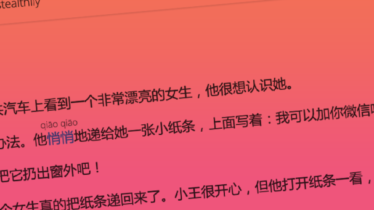mylingua review
There is no better way of learning Chinese than to literally be thrown right into it. Steve Kaufmann, perhaps the most well-known polyglot there is, once expressed the need to throw yourself into the language and accept those words that come your way, not specifically limiting your progress to “I rather focus on the basics first”. Yes – it is good to have a foundation first, but your brain will naturally first pick up those words that are most necessary for you!
Now, I have tried several Chinese apps throughout the past four years since I started studying the language – but, really, mylingua is a little different. I speak Chinese on a good level already somewhat around HSK 4-5, and when I was introduced to mylingua , I thought to give it a try. I had been wanting to enhance my reading and vocabulary, but I wasn’t exactly looking forward to another “reading app”, if you understand what I mean. This has never been my way of studying. So, I did have concerns. My thoughts now after trying it? I can’t get my head around how in the world I missed this – those times running into problems grasping the usage of some word would have been severely fewer.
1. In Short: What is mylingua About?
mylingua is all about reading and listening to articles in Chinese on all sorts of topics, which feature vocabulary on all levels focusing on the one you choose, making you feel the usage of a word. mylingua also displays translations and images on them for you to take in! Articles can be quite diverse and hilarious, making you enjoy the atmosphere when you read. They are collected from many different sources and are specifically adapted and translated for you with sources always cited – It in fact also gives you the chance to upload an own text! You can display and edit it using all the features offered by mylingua !
2. From the Beginning – or, From Just the Middle?
After registering there will immediately show up articles for you to click on – Titles are depicted in English. I like how the listing doesn’t go by degree of difficulty but simply interests. Even choosing the level of HSK 1, you will be naturally exposed to other necessary words important for the article. Like in real-life, we do not get to decide which words reach us, but depending on the context, you will just be exposed to and start welcoming many other words! As some of them keep repeating from article to article, you will take them in while reading without being aware of it (this happened to me many times before).
Let me tell you how the design of the platform is built. When you first create an account, you are asked to set a “level” that describes best how well you already know Chinese – sort of corresponding to the HSK levels. I chose HSK 4, which means that the articles I will get toread overwhelmingly, but not only, feature HSK 4 vocabulary. I will show you soon why this is amazing.
Then go ahead and choose your main interests. It doesn’t mean you will never get to read about family dilemmas if you don’t choose the category “family” right away, which is why I chose it (!) – don’t worry, this is only prioritising which topics you’d like to most read on. I personally chose four: family, society, lifestyle and culture.
You are all set. Now there will immediately pop up many articles for you. First I was scrolling through all the different headlines and found some quite amusing: “The Challenge of Booking a Restaurant with a Name Containing the Character “颖”” – haha, how does such a situation even exist?
I was introduced to very different types of articles, and I like that you can decide between two things at this point:
- You do not consider the vocabulary and simply choose the article of interest to you. I mean, the one mentioned above, I just had to read it. And naturally you will be exposed to vocabulary that you take in. Let’s say you’re feeling happy or excited about an article – did you know that these feelings will mix with the new words you learn? How we feel affects the way we memorise language, I’m happy to say that this is a linguistic fact. Next time you meet a same word somewhere else, your brain will recognise it much faster. mylingua alwaysmarks and displays for you the meaning of unknown words…
- You do consider the type of vocabulary you’d like to be exposed to and choose the article appropriately. As for me, I really wanted to learn and deepen my vocabulary on “cooking” – yes, I actually did, I love cooking, and it bothers me that I wouldn’t be able to tell someone how they first have to stirr the eggs before adding them… So, I clicked on the category “cooking”. You will genuinely benefit a lot from the exposure to these categories. Much vocabulary is really that type which you won’t get to know about unless you live in China or read about it, engaging within related circles.
3. Soak New Words In, Do Not Soak Words Out
If you speak some Chinese already, or, even if you are just getting started, you should take use of this app calling for a specific studying method: DON’T go and translate words from your own language into Chinese! – you may need time to get used to this. Wait until words come your way and then check how they are used, you may then do additional research on usages in different situations/sentences. When it comes to new vocabulary, we in fact need to lean back and not “force” words in our native language that we have held our whole life out into the new language. Our experiences and growing up with a word in our native language will never match the way the “equivalent” of it is used in the other language. Native speakers of the other language, too, had a whole lifetime internalising them. During that process, we never get to decide how a word reaches us – it simply happens, and we take in. This is what new innovative approaches to teaching language also build up on, such as the Growing Participator Approach (GPA) and it also is what Noam Chomsky (a most well-known linguist) has been putting forward. On the other hand, we must also suppress the urge to translate every single new word we come across. mylingua makes a point mentioning this when you first register: “Resist the urge to learn every unknown word. Let the repeated exposure from regular immersion do the work for you.” So, do take it slow. If you try to memorise too many words at a time, your understanding of each will be very limited and you may not be able to use them properly. Rather, focus on those which you come across over and over again while reading.
4. Import Your Own Text!
Finally, let’s look at the features mylingua exactly offers to you additionally to reading the articles.
The platform lets you keep an overview over the articles you read, and how many you finish a week. The same goes for all new words in an article which you finished. These are all saved under “progress”. Of course, there is the option to bookmark your favourite articles so you will find them more quickly.
What struck me most though: there is an option to import an own list of words you made to make mylingua suggest articles to you that more suit those words!
The file you upload needs to have a certain format (i.e Anki, text or CSV), but essentially in it you can upload any words you want, also regarding certain topics. I totally am planning to use this option soon for my “cooking”!
What’s another amazing thing is that you can also upload your own article and get a translation for it. It is exciting and beneficial to read articles, but it is also super exciting to write an own and share this content!
5. Summing up
Trying mylingua is worthwhile so much that you pick up Chinese vocabulary and grammar naturally while reading along. That’s a little like reading some newspaper or book of your interest, you care a lot more about the content than the words. It is exactly this interest and attention that lets you feel “happy” to come across new words.
Chinese certainly is a unique language with usages of words that can be very different to how we know them– this happened to me a lot. How to know which words are important to retain? I always say that the context and frequency of meeting a word matters, but not that you do. It does not matter if you did not come across a certain word, but when you do, you will know if it is important or not because you can tell from the context. Let’s say I want to be able to talk about a certain topic in Chinese, I will only get to know which words and phrases are important and relevant for this by being shown, by somehow coming across them first. “Language is all about imitating!” – It is not possible to know about them just like that. Playing into this as the core is what I appreciate about mylingua. And, too, the design of the platform is very straightforward and convenient to navigate through, immediately after registration you are able to start reading and there are not a lot of buttons to confuse you. I recommend this platform a lot and suggest that you do see for yourself, and even registration is a matter of just one click.










